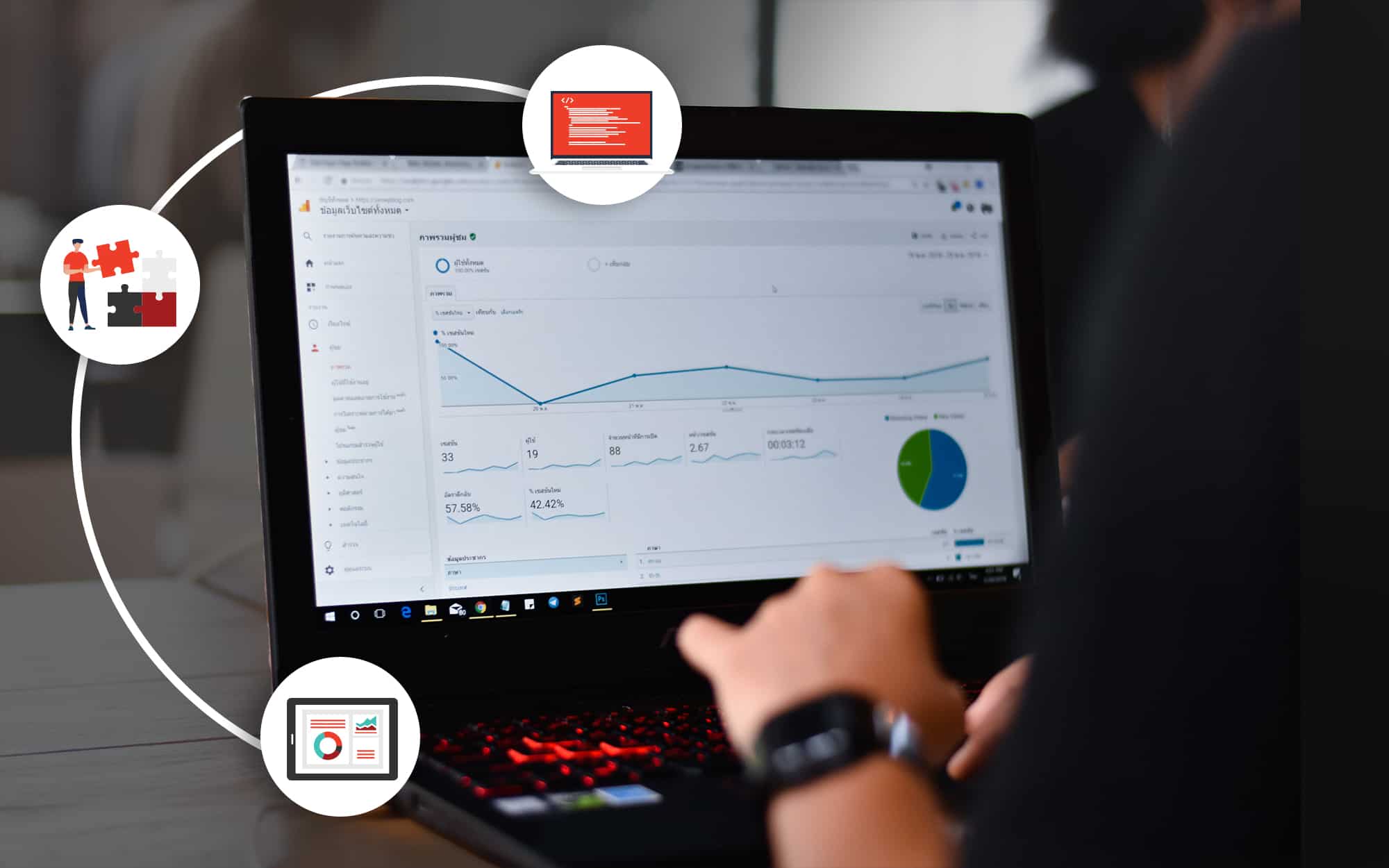

Have you ever wondered how some businesses seem to effortlessly appear at the top of your search results when you’re on a quest for a product or service online? Well, the secret lies in three powerful words: Search Engine Optimization (SEO).
Imagine SEO as a bridge connecting your business to potential customers via Google and various other search engines. It’s the wizardry behind the scenes that places you in front of eyeballs looking for exactly what you’re offering. And no, it’s not just about stuffing pages with keywords as we did in the old days; it’s an intricate dance with algorithms, understanding user intent, and providing value that truly resonates with searchers.
Ready to see what spells you need to cast for better visibility? Keep reading, and we’ll cover everything you need to know about SEO.
What is SEO?
SEO (an acronym for search engine optimization), is the art and science of enhancing your website to improve its visibility when people search for products or services related to your business in Google, Bing, and other search engines. The better visibility your pages have in search results, the more likely you are to garner attention and attract prospective and existing customers to your business, making it an impactful search engine marketing (SEM) strategy.
Why SEO is a Game Changer for Small Businesses
As a small business owner, you may wonder how to get your brand noticed online amidst countless competitors. Well, the secret sauce to standing out is none other than effective SEO. Here are some reasons why an SEO strategy should be a crucial component of your overall digital marketing and lead generation strategy.
Increasing Visibility in Search Engine Results
Think about it: When people need a product or service, their first stop is often a search engine. By optimizing your website for search engines, you’re essentially rolling out the red carpet for potential customers to find you. SEO helps elevate your business’s ranking on search engine results pages (SERPs), making you more visible to those who are looking for exactly what you offer.
Building Trust and Credibility With Potential Customers
Your position on search engine rankings is akin to a trust signal for customers. A higher rank often implies industry authority and trustworthiness, which can translate to greater credibility in the eyes of searchers. SEO helps build that trust by ensuring your business is prominently displayed and easy to find.
Gaining a Competitive Edge in Your Market Niche
Let’s face it: Competition is fierce, especially for small businesses. But here’s the catch – with a solid SEO strategy, you can leapfrog over your competitors. By targeting specific keywords and creating valuable content, you have the opportunity to make your business the go-to source within your market niche, giving you a distinct competitive advantage.
Abstrakt’s SEO lead generation experts empower growing businesses to stand out in a competitive market. Learn how we use expert SEO services to accelerate your business growth.
What are the Core Components of SEO?
Getting to grips with SEO means understanding its fundamental elements that contribute to a robust online presence. These components are the gears and cogs that help power your website up SERPs. Let’s dive into the key pieces of the SEO puzzle.
Website Structure
Your website’s structure can significantly influence how search engines interpret and rank your content. An organized, intuitive layout not only creates a better user experience but also makes it easier for search engine crawlers to navigate and index your site more efficiently. Consider your site’s hierarchy, URL structure, and navigation as foundational elements for strong SEO.
Content Marketing Materials
Content is king in the realm of SEO. Quality content serves several critical functions – it informs visitors, establishes relevance to your target keywords, and keeps users engaged. When you create and curate content that is valuable, accurate, and engaging, search engines take notice, and your rankings can improve as a result.
Link Building
Link building is like the vote of confidence in the SEO world. Inbound links, also known as backlinks, are a sign that others find your content valuable enough to link to. However, it’s not just about quantity—the quality and relevance of links pointing to your site play a significant role in how search engines perceive your site’s authority and trustworthiness.
- Website Structure: A well-planned site architecture enables better crawling and indexing by search engines.
- Quality Content: Providing useful and relevant content encourages organic sharing and attracts high-quality backlinks.
- Link Building Strategies: Actively seeking reputable and relevant links can significantly impact your site’s visibility and authority.
What’s the Role of Keyword Research in SEO?
If you’ve ever wondered how SEO pros seem to magically draw traffic to their sites, the answer might be less mystical than you think. It all begins with the cornerstone of any solid SEO strategy: keyword research. This isn’t simply about figuring out what people are searching for; it’s about diving into the language your potential customers are using and aligning it with your business objectives.
Here are some things you should do when performing keyword research:
Identify Keywords That Align With Your Business Goals
First things first, let’s get strategic. To bring in your ideal visitors, you need to think like them. What are the terms they might punch into Google when they’re looking for services or products like yours? Think beyond the obvious keywords and delve into the nuances of your audience’s language. Remember, it’s about getting into the nitty-gritty of your target audience’s intentions and making sure your content speaks their language.
Use Tools and Techniques for Effective Keyword Research
You don’t have to be a mind reader to figure out what your audience is searching for. Free and paid tools like Google’s Keyword Planner, SEMrush, Ahrefs, and Moz Keyword Explorer can provide a wealth of data on keyword volume and competition. Additionally, look at related search terms on Google, and observe which keywords your competitors are targeting. Moreover, the art of keyword research lies in discerning the long-tail keywords – those specific, often longer phrases that may have lower search volume but boast high intent and conversion potential.
Incorporate Keywords Into Your Website Pages and Blog Posts
The final step involves weaving your carefully picked keywords into the fabric of your website. This isn’t a job for a copy-and-paste approach – it’s more a fine art. Your aim is to integrate these terms naturally within your site’s content, titles, meta descriptions, and even image alt texts. Remember, overstuffing your pages with keywords is an SEO faux pas. Instead, aim for a harmonious balance that makes for a good reader experience while also giving search engines the right signals about your site’s relevance.
Effective keyword research is like laying down a strong foundation for a building; it supports everything else you’re going to construct. So, before you plow ahead with other aspects of your SEO strategy, make sure your keyword research is rock-solid. It could mean the difference between a website that rises to the top of search rankings and one that gets lost in the endless sea of online content.
For more insight into keywords and keyword research, read our blog here.
When it comes to enhancing your website’s visibility, mastering the best on-page SEO techniques is crucial. On-page SEO involves optimizing web page content for search engines and users. Common on-page SEO practices include optimizing your title tags, content, internal links, and URLs. Let’s delve into some of the key techniques that you can apply to optimize your web pages effectively.
Crafting Title Tags and Meta Descriptions for Optimal Results
Title tags and meta descriptions are HTML elements that provide concise explanations of the contents of web pages. They are displayed on SERP as the clickable headline for a given result and are important for usability, SEO, and social sharing. The title tag should include the main keyword to communicate page content relevance to search engines and visitors. Keep it under 60 characters to ensure full display on SERPs. The meta description should offer a clear and compelling reason for a user to click on your link, with a limit of 155 characters.
Optimizing Headers and On-Page Content
Your headers and on-page content also contribute to your SEO efforts. Beginning with a clear, relevant H1 tag, each subsequent header should organize content in a way that’s easy for readers to scan. Use relevant keywords in headers but avoid keyword stuffing. Ensure the content is informative and engaging and utilizes both primary and secondary keywords effectively within the paragraph elements.
- Use subheadings (H2, H3 tags) to structure your content
- Make your text readable, with short paragraphs and bullet points
- Emphasize important points with strong tags
Image Optimization and Their Effect on Page Load Speed
Images can considerably slow down your page load times if they’re not optimized. This directly affects your website’s SEO, as search engines give preference to sites with faster loading times. To keep your images from impacting load speed:
- Compress images to reduce file size without losing quality
- Choose the correct image format (e.g., JPEG for photos and PNG for graphics with transparency)
- Add descriptive, keyword-rich file names and alternative text to help search engines understand and rank the content better
Implementing these on-page SEO techniques can significantly improve your website’s chances of ranking well in search results. Remember, SEO is a continuous effort, and staying up-to-date with best practices is essential for success.
What’s the Role of Content Creation SEO?
Engaging your audience with high-quality content is a vital aspect of SEO. Not only does it help establish your brand as a thought leader in your industry, but it also has a direct impact on your search engine rankings. Let’s dive into how the right content can enhance your SEO strategy.
Create Quality Content That Resonates With Your Audience
Quality content is all about creating value for your readers. It should be informative, engaging, and relevant to their interests or needs. One of the main goals is to answer the questions your audience is asking, thereby positioning your website as a helpful resource. Remember, search engines favor content that users find useful and shareworthy.
Utilize Blog Posts and Articles to Drive SEO
Incorporating a blog or article section on your website can significantly aid in improving your SEO efforts. By targeting specific keywords within your content, you can attract more traffic through organic searches. Additionally, regularly updating your site with fresh content keeps it dynamic and more appealing to search engines.
Use Content Promotion Strategies to Maximize Visibility
Writing great content is just the first step. To truly maximize its potential, you need to promote it through various channels. Here are a few strategies you could adopt:
- Share your content across social media platforms to extend its reach
- Build an email list and use newsletters to inform subscribers of new content
- Collaborate with influencers or other businesses to co-promote content
- Use SEM and paid search (PPC ads) to boost visibility for top-performing content
By combining content creation with effective marketing channels, you’ll not only attract a larger audience but also improve your overall SEO performance.
Read our blog here to learn how you can build an effective multi-channel lead generation strategy.
Best Local SEO Strategies to Amplify Your Lead Generation Efforts
Local SEO is a game-changer for businesses targeting customers in specific geographic areas. It’s about making sure your business gets found online by people searching in your neighborhood. Let’s delve into some smart local SEO tactics that can help your business stand out in the local search results.
Leverage Google Business Profile for Local Discovery
Google Business Profile (previously known as Google My Business) is a powerful tool for local SEO. This free listing allows businesses to appear in local search results and on Google Maps. Make sure to claim your listing, provide accurate information, and keep it up-to-date with posts, hours, and photos to engage potential customers.
Use Local Citations and NAP Consistency
Local citations, which are mentions of your business name, address, and phone number (NAP), boost local search rankings. Ensure your NAP information is consistent across the web to avoid confusing both search engines and potential customers. Strong local citations come from reputable websites like local directories, business associations, and review platforms.
Target Local Keywords and Content for Community Engagement
Creating content with a local angle can significantly increase community engagement. Start by identifying local keywords that residents might use to find services like yours. Include these in your web content, blog posts, and social media updates to attract and engage a local audience.
- Host local events and write about them on your website
- Feature local news or related content that resonates with the community
- Collaborate with local influencers to create buzz around your brand
Combining these strategies will give your local SEO efforts a significant boost, ensuring that your business becomes a known entity in your local market!

How Does Mobile Optimization Fit into the SEO Puzzle?
Smartphones… ever heard of them?
As the world increasingly goes mobile, optimizing your website for mobile users isn’t just a nice-to-have; it’s an essential component of SEO success. With more than half of global web traffic coming from mobile devices, search engines prioritize sites that provide a seamless mobile experience. Let’s dive into why mobile optimization can make or break your website’s search engine rankings.
The Impact of Mobile-Friendly Websites on Search Ranking
Google has made it clear that mobile-friendliness is a significant ranking factor. Websites that are optimized for mobile have a leg up in the search results. This means ensuring that your site is responsive, with fast loading times and easy navigation on a small screen. If a user struggles to use your site on their phone, not only will they likely leave (increasing your bounce rate), but Google might demote your site in search results.
Best Practices for a Responsive Website Design
Responsive design ensures that your website looks great and functions perfectly on any device, from desktops to smartphones. Here are some best practices to follow:
Use flexible grid layouts that adjust to the screen size and orientation
- Implement scalable images and CSS styling that adapts to the user’s device
- Ensure clickable elements like buttons and links are easy to interact with on touchscreens
- Minimize text input required from users, as typing on mobile can be cumbersome
- Test your website on various devices and browsers to ensure compatibility
Learn how to create a lead-generating website by reading our blog here.
How Does Link Building Strengthen Your Website’s Authority?
Have you ever thought of your website as a virtual hotspot, a place where visitors feel compelled to come back, time and again? That’s the power of link building, a critical component in the SEO arsenal. It doesn’t just draw a map for search engines to find you; it adds weight to your site’s reputation, signaling that others vouch for your content.
Backlinking is similar to peer reviews in a scientific paper. It helps support credibility, showing that other sources back up your content and research. The more well-known the backer, the more authority your content or research obtains.
Here are some link building best practices to enhance your website authority:
Identify High-Quality Link Opportunities
Not all links are created equal. A link from a reputable source can be a goldmine for SEO, while a bad one can be a landmine! So, how do we strike gold? Focus on domains that are not merely related to your niche, but are authoritative and trustworthy. Seek out industry leaders, popular forums, or educational sites that have the influence and audience you aspire to engage. Remember, a single link from a credible site is worth more than a dozen from lesser-known corners of the web!
Earn Links Through Outreach and Content Marketing
The art of earning links lies in outreach and content marketing. It’s like throwing a party with a VIP guest list—reach out and entice them with your amazing content. Craft compelling articles, infographics, videos, or studies that provide unique value, solving problems or offering insights others haven’t. Then reach out to related websites, bloggers, and influencers, inviting them to share your masterpiece. It’s about building relationships, not just building links.
Monitor Your Backlink Profile for Health and Performance
Link building is an ongoing effort, very much like taking care of a garden. You need to keep an eye on the health and performance of your backlink profile. Use SEO tools to monitor which sites link to you, checking for the relevancy and authority of these links. Watch out for spammy links or those that could harm your reputation. If you spot these weeds, don’t hesitate to use tools like Google’s Disavow to tell search engines you don’t endorse those links.
- High-quality links: Aim for authoritative sources relevant to your niche
- Outreach: Build relationships with influencers, bloggers, and related websites to get your content out there
- Monitor: Keep tabs on your backlink profile and maintain its health for maximum SEO benefits
Remember, in the grand scheme of SEO, link building is all about creating the kind of web presence that others recognize and respect. When done right, it not only boosts your site’s authority but also its visibility, driving organic traffic and contributing to your overall SEO success. So, take the plunge and start connecting your website to the rest of the web—it’s time to build some links!

Understanding SEO Analytics and the Tools That Power Them
No, not those kinds of tools! We’re talking about SEO tools and the analytics that need to be measured to measure the impact of your SEO strategy.
Now that we’ve covered the various aspects of Search Engine Optimization, let’s dive into the crucial part of any digital strategy—analytics and tools. Without measuring our efforts, how do we improve, right? Let’s take a look at the magic behind the numbers and the tools that help us make sense of what’s working and what’s not.
Utilizing Google Analytics to Track SEO Performance
At the heart of SEO analytics is Google Analytics. It’s a powerhouse that lets you track website traffic, performance, and user behavior. With GA, you can monitor the results of your SEO strategy by seeing how users find your site, which pages they visit, how long they stay, and what actions they take. It’s all about getting a comprehensive view of what’s attracting visitors and, more importantly, what’s leading to conversions.
SEO Tools That Can Help Simplify and Improve Your Strategy
While Google Analytics gives you the ‘what,’ there’s a whole host of SEO tools out there to help you understand the ‘why’ and ‘how.’ Tools like SEMrush, Ahrefs, and Moz offer a deeper dive into keyword research, backlink analysis, and on-page SEO opportunities. They provide actionable insights that can help you simplify and improve your SEO strategy, making the complex world of search engine optimization much more digestible.
Interpreting Data to Make Informed SEO Decisions
Having data is one thing; knowing what to do with it is another. The key to a successful SEO strategy lies in interpreting data to make informed decisions. It’s about finding patterns, understanding trends, and making adjustments to your tactics. Ask yourself: Are certain pages failing to retain users? Is there an untapped keyword you should be targeting? Are your competitors doing something you’re not? With solid data interpretation, you can refine your SEO plan and stay ahead of the curve.
- Keep an eye on your bounce rates to gauge page content effectiveness
- Monitor inbound links and their quality to ensure a robust backlink profile
- Track your rankings for targeted keywords to measure SEO success over time
In essence, SEO analytics and tools are indispensable for any SEO practitioner. They don’t just provide data — they provide insights. They are the difference between guessing and knowing, between a shot in the dark and a targeted approach. So dive into the data, explore the capabilities of these tools, and start making more informed decisions for your digital presence.
Common SEO Mistakes to Avoid
Embarking on the SEO journey can be quite rewarding if you steer clear of common pitfalls. Many website owners unknowingly compromise their rankings by adopting misguided practices or overlooking crucial details. In this section, let’s demystify these misconceptions and highlight key errors to avoid, setting your site on a path to improved visibility and success.
Common SEO Misconceptions That Could Harm Your Rankings
- Keyword Stuffing: Overusing keywords can penalize your site. Focus on creating natural, valuable content for your readers
- Invisible Text: Hiding text for additional keywords is an outdated tactic that search engines now penalize
- Purchasing Links: Quality over quantity rings true for backlinks. Buying links can lead to a reduction in trust from search engines
Technical SEO Errors to Look Out For on Your Website
- Broken Links: Regularly check and fix broken links to ensure a smooth user experience and maintain link equity
- Improper Use of Redirects: Incorrectly implementing redirects can lose page rank and confuse search engines
- Slow Page Load Times: Speed matters. A slow website can negatively impact rankings and user satisfaction
The Risks of Over-Optimization and How to Avoid Them
In the quest to rank highly, it’s easy to go overboard with SEO tactics. Over-optimization can appear spammy and deter both users and search engines from trusting your site. Balance is key—ensure you’re optimizing for humans as much as for search algorithms. Always prioritize user experience, quality content, and sustainable, ethical SEO strategies.
What SEO Trends are on the Horizon?
The landscapes of digital marketing and search engine optimization are continuously evolving. As technology advances, so do the techniques and strategies that SEO professionals must employ to remain competitive. In this section, we’ll gaze into the crystal ball to examine how emerging technologies are setting the stage for the future of SEO and what this means for businesses and marketers alike.
How Emerging Technologies Are Shaping the Future of SEO
As the digital world becomes increasingly complex, emerging technologies are playing a pivotal role in the evolution of SEO. Innovations in areas such as voice search, virtual reality, and the Internet of Things (IoT) are starting to influence how we optimize for user experiences and search engine rankings. As these technologies become more mainstream, adapting SEO strategies to accommodate new search interfaces will be crucial.
The Role of Artificial Intelligence and Machine Learning in SEO
At the forefront of transformation is artificial intelligence (AI) and machine learning. Search engines are integrating these technologies to improve how they understand and respond to user queries. Consequently, SEO efforts are shifting towards optimizing for AI algorithms with a focus on relevance, context, and user engagement. Content quality and user experience are now paramount, as search engines strive to deliver the most accurate results to their users.
Anticipating Changes to Google’s Algorithm and Staying Ahead
Google’s algorithm is notoriously volatile, with frequent updates that can dramatically affect search rankings. To stay ahead, SEO professionals must keep their fingers on the pulse of these changes and adapt swiftly. One consistently reliable strategy is to prioritize high-quality, valuable content that serves the needs of your target audience. By aligning with Google’s mission to provide the best information, you can better weather the storm of algorithm shifts.
Staying informed about these trends and understanding how to leverage them will be the key to SEO success in the coming years. The future is unwritten, but by keeping abreast of these transformations, you can prepare your strategies to harness the burgeoning opportunities that these advancements are sure to provide.
Read our blog here to explore what’s on the horizon for B2B marketing.
Things to Consider When Hiring SEO Professionals or Outsourced SEO Agencies
If you’re feeling overwhelmed with the intricacies of SEO or simply don’t have the time to commit to developing your strategy, it might be time to consider hiring some help. However, not all SEO professionals or agencies are created equal. Here’s how you can ensure you’re making the right choice for your business.
Determining When It’s Time to Seek Professional SEO Help
Finding the right time to invest in an SEO professional or agency can be tricky. If you notice that your website isn’t showing up in search results, or your traffic has plateaued or decreased despite your own efforts, it might be time to call in the pros. Additionally, if you’re launching a new site or overhauling your current one, bringing in SEO expertise can be crucial to success from the start.
What to Look for in an SEO Professional or Agency
- Experience and Expertise: Look for a track record of success. Experienced SEO professionals should be able to share case studies or examples of how they have improved other businesses’ rankings and traffic.
- Transparency: Trustworthy SEO agencies will be transparent about their methods and realistic with their promises. SEO is a long game, and instant results are typically not possible.
- Understanding of Your Industry: Find someone who understands your industry and target audience. They should be well-versed in the particular challenges and opportunities present in your niche.
- Comprehensive Services: An effective SEO strategy involves various elements, from on-page optimization to link-building. Ensure the agency or professional offers a full suite of services.
Questions to Ask Before Hiring or Signing an SEO Services Contract
Before you sign on the dotted line, make sure to ask potential SEO providers these important questions:
- Can you share some success stories and the results you’ve achieved for other clients?
- How will you adapt your strategy to our unique business and industry?
- What are the key performance indicators you will use to measure success, and how often will you report on them?
- How do you stay current with Google’s algorithm updates and SEO best practices?
- Can you explain your link-building strategy and how you develop high-quality backlinks?
- What is your policy on transparency, and how I can track your work?
Hiring the right SEO professional or agency can transform your online presence. Take your time, do your homework, and choose a partner who will help your business achieve the search engine success it deserves.
Key Takeaways
SEO is a vital marketing and advertising strategy that allows you to bring in more customers and generate leads through your website who are actively looking for a solution to their pain points.
While it is an incredibly impactful way to generate leads organically online, it requires consistent work and efforts to sustain a digital marketing strategy that yields results. And as a small business, you probably don’t have the time or expertise to prioritize the impact of SEO. And when you don’t, that’s when you look for help from an outsourced SEO lead generation provider. And that’s where Abstrakt comes in.
At Abstrakt Marketing Group, we provide growing B2B businesses with all the resources they need to build and sustain an SEO strategy that works. Our outsourced SEO lead generation services empower growing small businesses like yours to fill their sales pipelines with ready-to-buy sales leads.
When you’re ready to experience the impact of Abstrakt’s SEO lead generation solution, contact a sales rep today!




